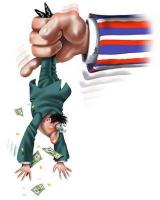 Some of the most heated discussion over the bailouts has been around executive bonuses and lavish parties ongoing at the corporate beneficiaries of redistribution.
Some of the most heated discussion over the bailouts has been around executive bonuses and lavish parties ongoing at the corporate beneficiaries of redistribution.
This debate, fueled by the government’s kept media, serves two primary purposes:
.
.
1) To redirect the water cooler discussion to the millions in bonuses while distracting the masses from the hundreds of billions that were extracted from them in the first place
– and more importantly –
2) To reinforce the meme that government is good and the free market is bad.
To make the first point clear, we’ll use the AIG bailout and the recent uproar over $150 million in bonuses paid out to executives. I present you with a bar graph comparing the $150 million in bonuses to the $150 billion that the AIG bailout has cost (so far…) I had to stretch it out a little to get the bonuses to show up, so you may have to scroll a bit. Pardon me for not inserting it directly in the post.
The great physicist Richard Feynman once commented:
There are 10^11 stars in the galaxy. That used to be a huge number. But it’s only a hundred billion. It’s less than the national deficit! We used to call them astronomical numbers. Now we should call them economical numbers.
Of course, that was in Feynman’s day. Today, the national deficit will be $1.7 trillion dollars. These numbers are not even comprehensible to humans. I propose that we rename Feynman’s economical numbers to governmental numbers.
And yet, the masses debate over $150 million…
On to the second and more important point: To shift the blame from government to the “free market.”
The institutions in question are the farthest thing from free market institutions. They are creation of the State. The government builds these corporations with legislation and regulation designed to protect them from competition. In return, government officials get their campaign coffers filled and score highly paid positions within these corporations when their term is done (not to mention the many under-the-table benefits we never hear about.) This cozy government/business partnership is not capitalism, it is corporatism.
These corporatist institutions would never survive in a truly free market. Government creates them, and then gets to blame the free market and capitalism when they inevitably fail. This reinforces the meme that the free market is greedy, corrupt, and will run out of control without the hand of government to guide it and keep the greedy capitalists in check. Study your history, and you’ll find that the robber barons have always been highly politically connected, and have used the force of the State to gain their monopoly position. Corporatists hate the free market, it is too uncertain. They seek State power to kill their competition, to reduce the amount of uncertainty in their market.
Bailouts are an inevitable result of the corporatist state. The business models fail because protectionism breeds complacency, and inefficiency results. But even more importantly, the cozy relationship with the parasites in DC (and their central bank) encourages irrational risk-taking behavior, because they know they’ll be bailed out if they fail.
The worst effect of the failure of corporatist enterprises is that the government gets more control over the market. It is a truly vicious cycle: Government creates the corporatist system, then grows in size and power when its creation fails, as there is outcry for more protection from the “greedy capitalists.”
So please, keep your eye on the ball, and don’t let the government and its kept media distract you. Place the blame where it belongs: The Federal Government and its evil central bank, the Federal Reserve System. Without them, no one gets “too big to fail.” No one gets to privatize their profits while socializing their losses. In a true free market, scandal and unscrupulous practices will still exist, but they will be dealt with swiftly and judiciously – and you won’t be forced to pay for it.




